by Lisa Cooke | Apr 22, 2019 | 01 What's New, Beginner, Brick Wall, Research Skills
Have you reached a dead end on one branch of your family tree–you can’t find the parents’ names? Check out these sources for finding ancestors’ parents.
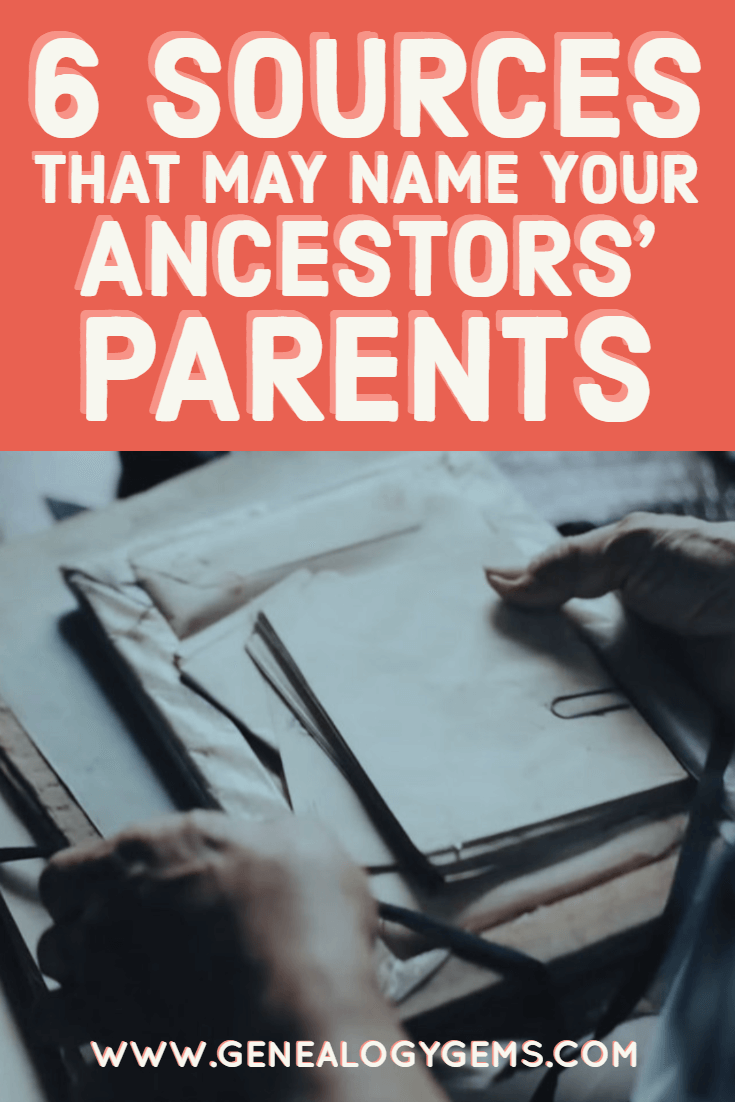
Recently Genealogy Gems podcast listener Trisha wrote in with this question about finding marriage license applications online. She hoped the original application would name the groom’s parents. Unfortunately, her search for the applications came up dry. So, she asked, “Are there other documents that would have his parents names listed on them?”
Here’s a brainstorm for Trisha and everyone else who is looking for an ancestor’s parents’ names (and aren’t we all!).
6 Record Sources that May Name Your Ancestors’ Parents
1. Civil birth records. I’ll list this first, because civil birth records may exist, depending on the time period and place. But in the U.S. they are sparse before the Civil War and unreliably available until the early 1900s. So before a point, birth records–which will almost always name at least one parent–are not a strong answer. Learn more about civil birth records in my free Family History Made Easy podcast episode #25.
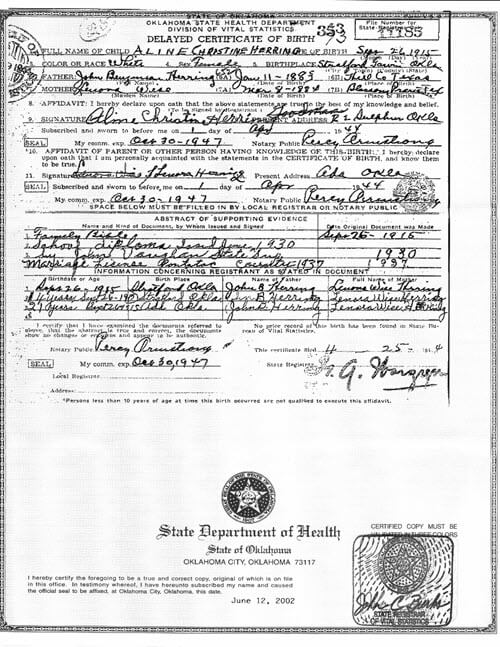
2. Marriage license applications. Trisha’s idea to look for a marriage license application was a good one. They often do mention parents’ names. But they don’t always exist: either a separate application form was never filled out, or it didn’t survive. Learn more about the different kinds of marriage documents that may exist in the Family History Made Easy podcast episode #24.
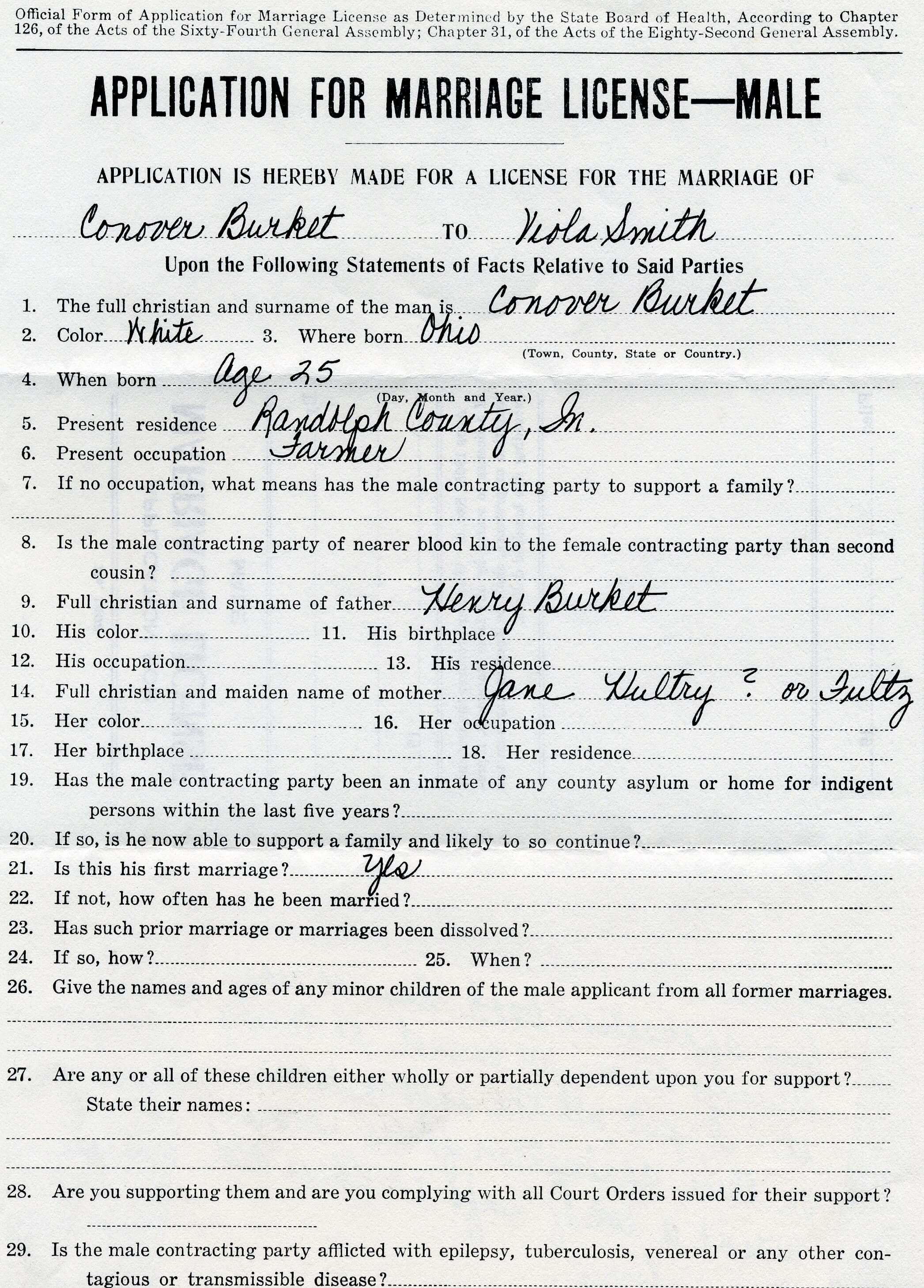
3. Obituaries. Obituaries or death notices are more frequently found for ancestors who died in the late 1800s or later. Thanks to digitized newspapers, it’s getting SO much easier to find ancestors’ obituaries in old newspapers. My book How to Find Your Family History in Newspapers is packed with practical tips and inspiring stories for discovering your family’s names in newsprint. Millions of newly-indexed obituaries are on FamilySearch (viewable at GenealogyBank). Get inspired with this list of 12 Things You Can Learn from Obituaries!
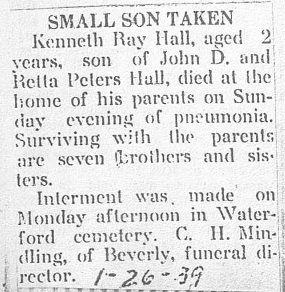
4. Social Security Applications (U.S.). In the U.S., millions of residents have applied for Social Security numbers and benefits since the 1930s. These applications request parents’ names. There are still some privacy restrictions on these, and the applications themselves are pricey to order (they start at $27). But recently a fabulous new database came online at Ancestry that includes millions of parents’ names not previously included in public databases. I blogged about it here. Learn more about Social Security applications (and see what one looked like) in the show notes for my free Family History Made Easy podcast episode #4.
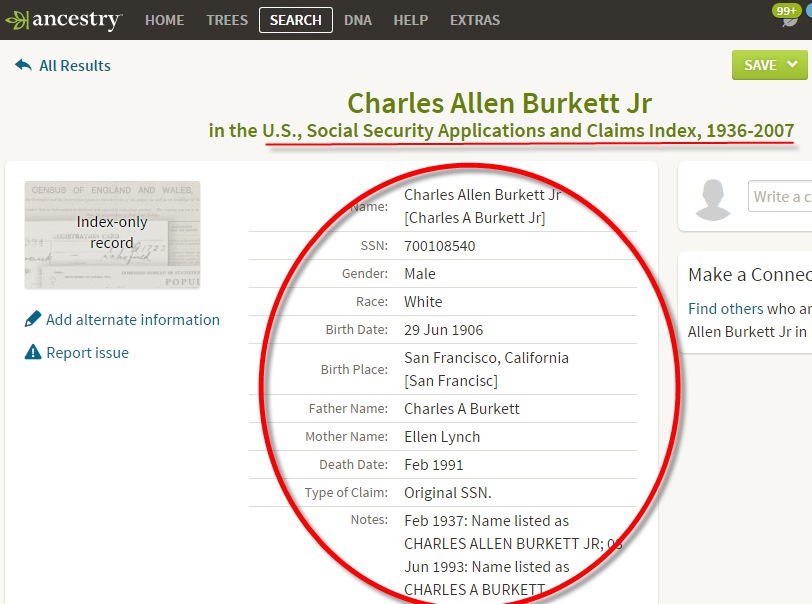
5. Baptismal records. Many churches recorded children’s births and/or the baptisms of infants and young children. These generally name one or both parents. Millions of church records have come online in recent years. Learn more about birth and baptism records created by churches in the Family History Made Easy Podcast Episode #26. Click these links to read more about baptismal records in Quebec and Ireland.
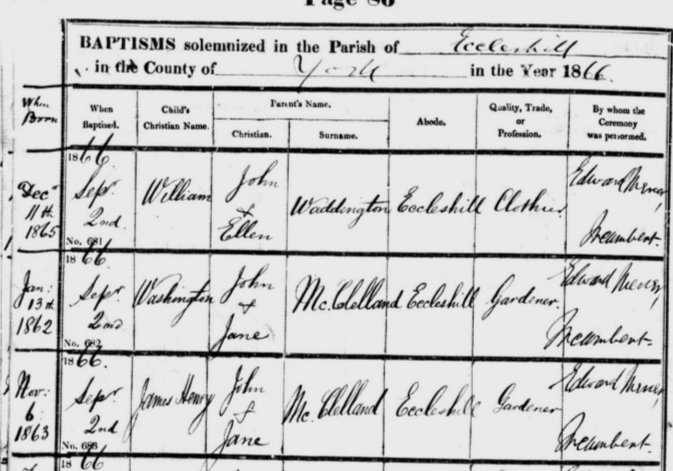
6. Siblings’ records. If you know the name of an ancestor’s sibling, look for that sibling’s records. I know of one case in which an ancestor appeared on a census living next door to a possible parent. Younger children were still in the household. A search for one of those younger children’s delayed birth record revealed that the neighbor WAS his older sister: she signed an affidavit stating the facts of the child’s birth.
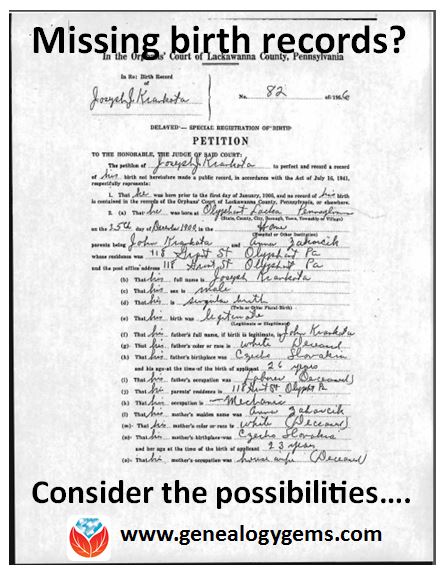
Thanks for sharing this list with anyone you know who wants to find their ancestors’ parents!
More Genealogy Gems on Finding Your Ancestors in Old Records
Missing Birth Record? Here’s What You Can Do to Track it Down
Try These 2 Powerful Tools for Finding Genealogy Records Online
Finding Ancestors in Courthouse Records: Research Tips
(Premium website membership required)
About the Author: Lisa Louise Cooke is the producer and host of the Genealogy Gems Podcast, an online genealogy audio show and app. She is the author of the books The Genealogist’s Google Toolbox, Mobile Genealogy, How to Find Your Family History in Newspapers, and the Google Earth for Genealogy video series, and an international keynote speaker.
This article was originally posted on November 3, 2015 and updated on April 19, 2019.
by | Mar 25, 2014 | 01 What's New, Church, Family History Podcast, Records & databases
 Family History: Genealogy Made Easy
Family History: Genealogy Made Easy
with Lisa Louise Cooke
Republished March 25, 2014
[display_podcast]
Download the Show Notes for this Episode
Welcome to this step-by-step series for beginning genealogists—and more experienced ones who want to brush up or learn something new. I first ran this series in 2008-09. So many people have asked about it, I’m bringing it back in weekly segments.
Episode 24: Using Marriage Records in Family History
So far in this podcast series you’ve made a lot of progress. You’ve set up your genealogy database, talked to your relatives, gotten familiar with the Family History Centers and you have your research worksheet to lead you in your investigation backwards in time, through death records and the census.
In today’s episode we’re going to continue working backwards down the records aisle looking for marriage records. Marriage records are a type of vital records, meaning they provide vital statistics for a person’s life. They can be a rich—even vital!—source of genealogical information.
Marriage records, like death and birth records (which we’ll be covering in an upcoming episode) are primary sources. This means that the record was completed at the event or very close to it by someone who was present at the event. That means it’s a pretty reliable source.
There are two types of marriage records: civil records which are recorded with the local government, usually at the county level, and church records, if the marriage took place in a church.
Update: Many government and church marriage records have found their way into major genealogical databases (www.Ancestry.com, www.FamilySearch.org, www.FindMyPast.org, www.MyHeritage.com, etc). Look for indexed records and—if you’re lucky—digitized versions of the actual record. (If you find only indexed records, use the process below to find copies of the actual record.)
Civil/Government Marriage Records
You need to determine where the marriage took place in order to figure out the proper civil authorities to contact. Usually that’s the clerk in the town, county, district or parish where the happy couple said “I do.” In the U.S., chances are it was at the county level, but if you’re not sure, do a Google search on the name of the county and the phrase “vital records” or “marriage records.” Chances are one of the first search results will be a link to the website for that county and hopefully the specific page that will tell you how to request vital records. There you should find specific instructions about how to make the request and any fees involved.
I have three tips for you:
- Tip #1: Be sure and follow the instructions to the letter because otherwise you will likely have your request returned to you unfilled and asking for more information which just wastes time.
- Tip #2: As with Death Records, it isn’t necessary to order a certified copy because you are not using it for legal reasons, just information reasons. Certified copies cost more and usually have more requirements to applying for them.
- Tips #3 Request a complete photo copy (which is sometimes referred to as a LONG FORM) rather than a SHORT FORM which can be a brief transcription of the record. There may be clues in the original record that may be left out (or mistranscribed) in the SHORT FORM.
If all this sounds cumbersome there is an easier to request marriage records and that is through Vitalcheck.com (see below). While it costs more you can order the records quickly and easily online.
If you’re looking for civil records in England or Wales, those records have been officially recorded by local District Registrars who reported to the General Registrar Office since July 1, 1837. These records are probably easiest to access, particularly if you are not in the UK, through FindMyPast.com, which does charge a fee for each record.
Types of civil records:
- Marriage application. I can’t guarantee they’re available in every county, but it’s definitely worth asking!
- Marriage license. This record often holds the most genealogical value. It will include their names, ages, residences as well as perhaps their race, occupation, age, and perhaps their parents’ names.
- Marriage register record. This confirms the marriage actually took place. This may be just a signature and date from the official who performed the marriage, and may be a small section at the end of the marriage license information. (The latter type of record may also be called a “marriage return” or minister’s return.”
- Marriage certificate. While this record is part of the process it isn’t available through the vital records office. It would have been kept by the couple and will involve some looking around and asking relatives to see if it still exists.
Tip: A marriage license alone does not prove a marriage. A couple could easily apply for a license but never go through with the big day.
Church Marriage Records
Start looking for these records at the Family History Library (www.familysearch.org).
Other places to look:
- The church if it still exists. Search for their website. Contact the church office and ask if they have records for the time period you’re looking for. If they no longer have the records ask where they are being archived.
- Check in with the closest local library and ask to talk to the reference desk.
- Search the WorldCat catalog (see Links).
- Check the US Gen Web site for the state and county where the marriage occurred (see Links). These sites are run by volunteers and each county has a different variety of records and resources available. Contact the local genealogy or and historical societies and ask for their help.
Other records to look for:
- Banns of marriage records. Look for a record of the banns in the church minutes or church bulletins.
- Newspaper marriage announcements. Tip: Keep in mind when you’re searching a newspaper database and you find a listing for what appears to be the right family in the right area but the date is way off, be sure and check it out because it just may be a republishing of the news you were looking for! (Learn more about newspaper research in my book How to Find Your Family History in Newspapers.)
Links/Updates
FamilySearch. To search for marriage records by place, click on Search, then Catalog, then search by location. You’ll find both government and church marriage records listed here. Look at the county level for U.S. government records; look at the municipal level or under the Church records category for church marriage records.
USGenWeb
WorldCat
VitalChek













